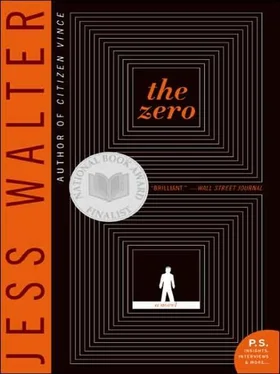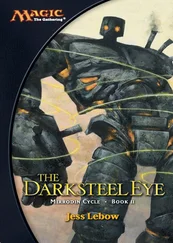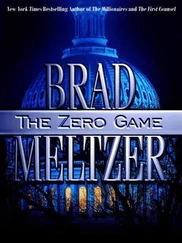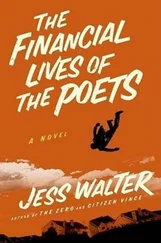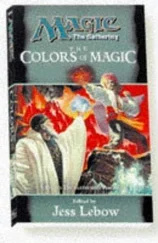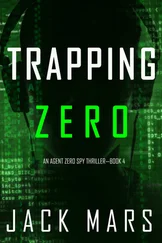“Sure,” Remy said. “Go ahead.”
When he returned to the bathroom, April was staring out the window. After a moment, the cell phone slipped from her hand and clattered to the floor. April stared at it as if she’d never seen one before.
She took a deep breath. “The lawyer called,” she said quietly. “While I was showing this place. He got my settlement. Six hundred twenty thousand.” Her body seemed to hang from her spine like a robe on a hook. “I guess that’s what you get for a slightly used, cheating husband these days. Six-twenty. I guess that’s fair.” She looked down. “I should’ve asked, just for comparison, what a sister was worth.” But the joke was flat, and she covered her mouth with her fist and spit a kind of self-loathing laughter.
He began to move toward her, but bent and picked up her phone instead.
“I’m sorry, Brian,” she said. “But the worst part has always been how much I miss him. I don’t want to… but I do.”
“I know,” Remy said, and he handed her the-
BAR IN an Upper West Side restaurant, where he sat alone, staring through a full glass of whiskey, caramel colored and distorting everything in the room. Behind him, couples sat in red-tucked booths beneath beaded floor lamps; it was a jointy and comfortable place and Remy felt at ease here. He looked out the window. It was dark outside, that surprising early winter darkness that descended like a drawn blind. He looked back at the small glass of amber liquid on the bar in front of him, lifted it, hesitated, then brought it to his lips and downed it. So warm. He wondered if April was meeting him tonight. He pulled out his phone and thought about calling her and realized that he couldn’t come up with her number.
“That’s a fane whiskey, boyo.” The bartender spoke with an affected Irish accent, but Remy didn’t mind because it was, indeed, a fane whiskey. “D’ya know what you want to ate, than?”
Remy put his phone away and picked up the menu. Sure enough, there it was. He could take comfort in that, at least. “I’ll have the wasabi duck marinated in red wine.”
“Have way goat that?” The bartender took the menu and opened it. “Aye, thar ’tis. Moost be new, eh?” The bartender took the menu and snapped it against his leg. He winked, and slid another whiskey in front of Remy, who drained it.
“Excuse me. Mr. Remy?” There was a man at his shoulder, wearing the white shirt of a chef, buttoned at his shoulder.
“Yes?” He looked up, wondering for a moment how the chef knew his name.
“Brian Remy?”
“Yes. That’s me.”
“I have been instructed to tell you-” the man looked around the restaurant before bowing even closer. “This is reather embarrassing.” He stared hard into Remy’s eyes: “There is no wasabi marinated duck.” When Remy didn’t answer, he said, “Do you understand?”
“I think so,” Remy said, pulling away from him. “Can I get something else?”
“You do understand what I’m saying?” the chef asked.
“There’s no duck.”
“Actually-” The man shuffled his feet nervously. “It’s beginning to look like there never was any wasabi marinated duck.” He tried to laugh this off, as if it had all been a funny misunderstanding, but his laugh was edgy and raw.
“O-o-okay,” Remy said. “Can I get… a steak, maybe?”
“Of course,” the man said, relieved. “Is that the course you’d like us to take?”
“I… I guess so. Yeah.”
“Excellent,” the chef said. “What kind?”
“I don’t know,” Remy said. “A ribeye?”
The man’s eyebrows shot up. “A ribeye!”
“Yeah… I think so.”
“I’ll tell them,” the chef said. He slipped Remy a matchbook and spun to walk away. Remy looked at the matchbook. He opened it. Written on the lip of the matchbook was one word: WALK.
Remy reached in his pocket, found the bottle of pills from his psychiatrist, and fumbled with the lid. Finally he got two out and swallowed them with a long drink of lemon water as he read the matchbook again.
“How did you want that?” The man was at his shoulder again.
Remy jumped. “What?”
“The ribeye, sir? How do you want it?”
“I don’t know.” Remy looked around for help. “Medium…” he said, but when the waiter looked concerned, he added, “…rare? Medium rare?”
“Excellent.” The chef bowed. “I will let them know.”
His steak arrived one whiskey later, steaming on a plate of potatoes, with a quiver of asparagus. The meat was lightly marbled and his steak knife glided through it. He jabbed it with his fork and it bled profusely, and he put it in his mouth. It was incredible, the best thing he’d ever eaten. The meat had a blue cheese glaze and the blood and cheese gave his plate a purplish tint. There were garlic mashed potatoes, too, and they turned purple from the blood, and the asparagus spears, too, the whole plate swimming in dark blood. Remy couldn’t believe how much this steak bled and how good it was, and his eyes rolled back in his head as he ate. Another whiskey came, and it, too, was better than he could ever recall a whiskey being.
And when he was done, Remy put on his overcoat and began walking, across glaring traffic, down blocks with empty stoops, bags of garbage out for collection, across another street and into the park. It was a pleasant surprise, finding himself in the park, cutting across its northwest corner, and he was well into the park when he suddenly stopped and wondered why he didn’t have his car, or why he didn’t take a cab. What was he going to do, walk home forty blocks? Still, it was nice: a great steak, some whiskey and a walk through the park, especially this corner, his favorite part of the park – less traffic here, buildings that lurked over the tree line. He turned and began walking again, and had the warm feeling of being at the end of something, of being cradled by these warm buildings, by civilization. As the sidewalk curled past a dark stand of trees, Remy noticed that two streetlights here were burned out. He slowed. There was someone waiting in the shadows.
“Do you want to know what I find interesting?” asked a familiar voice.
Remy came closer and saw that it was the old Middle Eastern man in the long wool coat. He was leaning against a shadowed tree. Remy couldn’t quite make out his face, but it was him, he was sure. “The way people here mock a religion that promises virgins waiting for martyrs in the world after this one. Your own culture would seem to indicate that there is nothing more profound than sex, nothing more humbling or graceful or suggestive of the mystery of creation. And yet the idea of virgins in paradise somehow seems to draw your greatest scorn. Do you honestly imagine yours is a sexless heaven? What kind of paradise is it that has harps and angels but no orgasms?”
Remy took a step back.
“What’s the matter? You seem disappointed to see me.”
“I was kind of hoping you were a hallucination.” Remy reached in his pocket and emerged with the bottle of pills again. He popped the cap and two capsules spilled into his hand. He swallowed them. “My psychiatrist told me you didn’t exist.”
“That’s not surprising.” The man smiled warmly and spoke in a soft, mellifluous voice, like a professor giving a lecture. “You’re always convincing yourselves that the world isn’t what it is, that no one’s reality matters except your own. That’s why you make such poor victims. You can’t truly know suffering if you know nothing about rage. And you can’t feel genuine rage if you won’t acknowledge loss.
“That’s what happens when a nation becomes a public relations firm. You forget the truth. Everything is the Alamo. You claim victory in every loss, life in every death. Declare war when there is no war, and when you are at war, pretend you aren’t. The rest of the world wails and vows revenge and buries its dead and you turn on the television. Go to the cinema.”
Читать дальше
